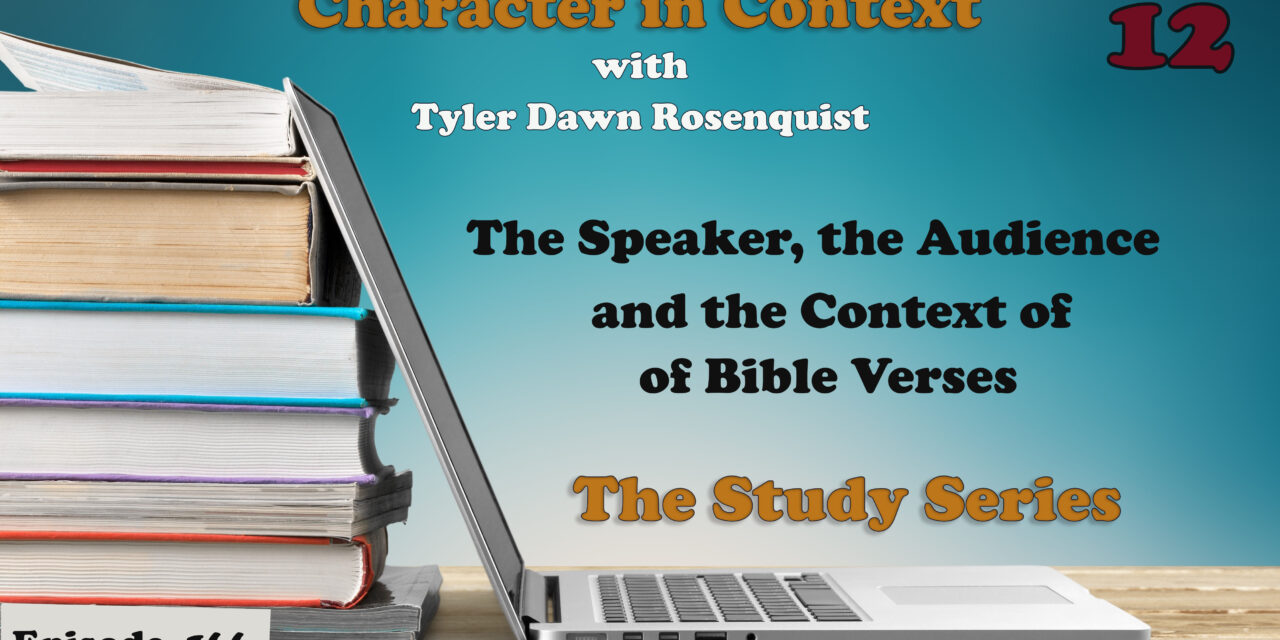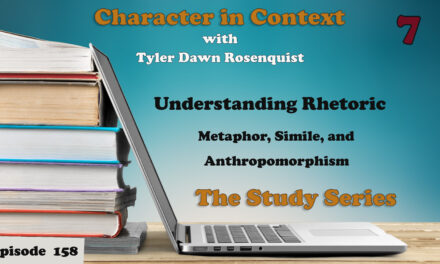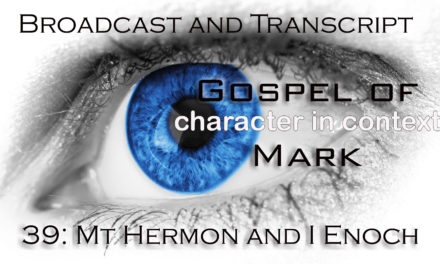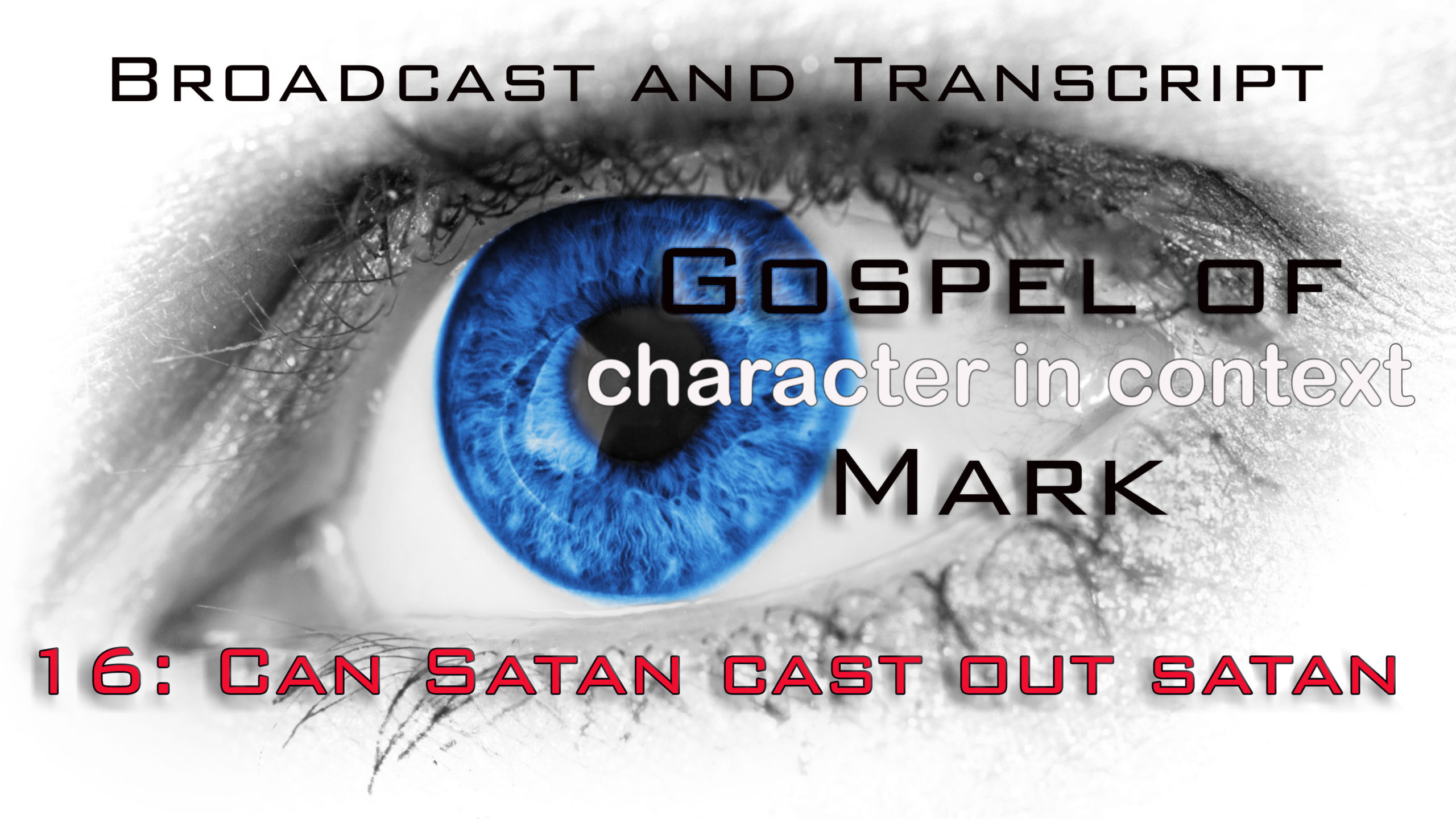If you have ever sent me a question asking me about such and such, I will almost always ask you for the book, chapter and verse. Not because I don’t know my Bible, but because I respect it enough not to lean on the Holy Spirit to teach me something out of context. Who a section of Scripture is addressed to is just important as who the speaker is, what situation is being addressed, the genre type, and what the historical reality is. When we don’t know these things, we can turn the Bible into a cherry-picker’s idea of paradise where anything can mean whatever we want it to mean.
(My affiliate links for Amazon products are included in the post. As an Amazon Associate, I earn from qualifying purchases.)
If you can’t see the podcast player. click here.
Hi, I am Tyler Dawn Rosenquist and welcome to Character in Context, where I usually teach the historical and ancient sociological context of Scripture with an eye to developing the character of the Messiah. But not right now, right now I am doing a series about how to not waste your time with bad study practices, bad resources, and just the general confusion that I faced when I started studying the Bible and was trying to figure out what to do and whose books I should read. Bottom line, I read a lot of nonsense and spent a ton of money on it. I am going to give you some basics on how to avoid a lot of the pitfalls, save money, maximize your time and effort, and get the most out of what you are doing. Master book list can be found here and I will add to it as needed.
Something that happens to me (and every Bible teacher, I imagine) is that people will describe a verse to me and ask me what it means. Now sometimes I will have a decent idea about what verse they are talking about and other times I am pretty sure that they are combining a couple verses into one or citing one of those verses that you see repeated verbatim or almost verbatim in a number of different settings. Regardless of the situation, I ask them to find the verse for me and to give me the chapter and verse so that I can (hopefully) give them some insight on what it means or at least what my take on it is based on the context. If I get really lucky, it will be in a section of Scripture that I have taught because that means I have read lots and lots of books about it by various scholars and theologians. If I am clueless about it—like Ezekiel’s wheels, I will just admit ignorance and try to point them to someone who likely has a better answer than I do or to a scholar whom I respect who has written a book or three on it. But when I am personally studying out a verse, I start from the shallow end of the pool before diving into the deep end.
The first thing that I make sure I know when I am given book, chapter, and verse is the time period and location in which the book was written or written about. Esther, for example, takes place in the fifth century BCE, under the dominion of the Medo-Persian Empire, situated within the citadel of Susa—none of it takes place in Israel and no one in the book has ever even been to Israel. The laws of the Land are Persian and not from Torah, but like ancient Israel, the culture is focused on honor/shame dynamics and people identify as parts of a larger clan, community, and nationality and not at all as individuals. Some characters are Jews and others are not. And so who is talking is just as important to the context of any verse as who the audience is. Is there a timeline? Is there a crisis? Who are the major players in terms of people and nations and controversies? Those are the kinds of questions we ask when the book is in narrative, or story, form.
What about the Psalms and various songs of the Bible? We have to ask entirely different questions. Do we know who the Psalm in question is attributed to and what time period i.e.. post-Exodus as in the case of the songs of Moses and Miriam, the time of the Judges as in the case of Deborah, or the various psalms that could be from David, Asaph, or the people of the exile. Is it a song of triumph, or a lament, or an enthronement psalm, (aka coronation psalm), is it one of the psalms the Levites would sing daily at the Temple, or the pilgrims would sing on their way up to Jerusalem, or one penned specifically for a festival? And there are many prayers in the Bible—who spoke them and why? What specific situation were they geared toward? Does it represent a prayer that can be used universally or does it only mean something within a very specific situation?
Wisdom literature has to be read entirely differently than any of the above because it speaks of extremes and what should be true, speaking in absolutes that they and we know are unreasonable. Yes, the son of a righteous man should never be begging for bread but we also know that it is indeed the case in regions of terrible warfare and persecution and it is during those times when the righteous are the most likely to suffer. Check out Viktor Frankl’s Man’s Search for Meaning (affiliate link). He talks about his time in the Concentration Camps and how it was the most righteous who died because they would give away their bread and who would volunteer to work in place of the sick and who wouldn’t hide in the back or in the middle of the group when dangerous work assignments were being given. The prosperity Gospel doesn’t work very well when you are truly self-sacrificing. Wisdom literature is about extremes and it teaches concepts designed to impart general wisdom—what should happen when everything goes as it should. How about parables and allegories? They are teaching stories designed to get people thinking outside of the box. And apocalypses, the literature of the oppressed, telling them that God wins in the end through clever uses of well-known cultural and biblical symbols.
What was the original language? Hebrew, Aramaic, or Greek? What cultural influences do we have to take a look at—Egyptian, Canaanite, Assyrian, Babylonian, Persian, Greek (Hellenistic), or Roman? How have concepts and the language changed from one part of the Bible to another? Are they under their own rulership, or slaves, or in exile, or under foreign rule at home? Is the writing attributed to a prophet, a king, a judge, a patriarch, a historian, a priest, or an apostle? Was the original audience Hebrew or Gentile or a mixture of both? Do we know the city, and the history of the city, and the time period, and what their laws were? Is there archaeology to help us understand what is being expressed? And you might think, “Geez Louise, all I asked is what ‘His word never comes back void’ means”! And all that might seem impossible to be able to balance all that information out, but the truth is that once you have studied for a long time, all that info is kinda either tucked into your brain somewhere or you at least know where to find it without much trouble. I am not saying that you always need all of that for everything, but when you are wondering about the meaning of a confusing verse, it all really helps a lot. All that being said, no one needs to be a rocket scientist to understand that one of Paul’s most common messages in the epistles/private or public letters is, “Stop acting like jerks, you’re making Jesus look bad.”
And of course, despite BibleGateway (which I use a lot) giving you one verse before and one verse after as “verse in context” that really doesn’t cut it. Most memory verses, in my experience, don’t mean what they seem to mean outside of their context. Let’s look at some really abused verses, just for fun, because this is a pet peeve of mine:
“Do not judge, so that you won’t be judged. For you will be judged by the same standard with which you judge others, and you will be measured by the same measure you use. Why do you look at the splinter in your brother’s eye but don’t notice the beam of wood in your own eye? Or how can you say to your brother, ‘Let me take the splinter out of your eye,’ and look, there’s a beam of wood in your own eye? Hypocrite! First take the beam of wood out of your eye, and then you will see clearly to take the splinter out of your brother’s eye.” (Matt 7:1-5 CSB)
Now, I started with a softball verse—the speaker is Yeshua/Jesus. The audience is all of the people who followed Him in the wilderness and were present for the Sermon on the Mount. They were Jews living in the Galilee, an agrarian culture north of Judea and the city of Jerusalem and out of reach of the Temple hierarchy. They were under the rule of Herod Antipas, one of the sons of Herod the Great, a puppet ruler under the thumb of Rome. I could go on but the truth is that none of that is really all that useful for this particular verse, “Do not judge, so that you won’t be judged.” Remember last week when we talked about how to and not to use a Concordance? Well, today we are going to look up the word judge and see what it looks like in Greek. Okay wow, I stopped my counting at twelve different root words for different kinds of judging and judgement. And these words can mean anything from condemnation to simple discernment of the difference between good and evil. The form of judging in this verse refers to actual condemnation, making a final sort of judgment. What this is most certainly not doing is telling us that we aren’t to discern between what is good and what is evil. You can’t condemn a child molester to eternal damnation but you can absolutely condemn the crime. Only Yahweh can condemn, the rest of us are just either guessing or indulging in wishful thinking. We do not have any idea who is beyond salvation or redemption. We just don’t. We aren’t judges and so we don’t get to condemn. Evil acts we can condemn, absolutely—to which the rest of the context of this section of Scripture attests. How can we remove the log from our own eye if we cannot discern between good and evil in our own lives, and how can we then help a brother or sister with the spec in their own eye, again, if we cannot make a judgment between what is righteousness and what is transgression? So, we are absolutely required to discern and grow in discernment (and this isn’t some magical spiritual gift where everything we are offended by is something to condemn as evil but comes from wisdom that we gain through experience and time and tempered by love and mercy) but we are put firmly in our place as to the penalty for encroaching upon the right of God to judge mankind—namely, our own condemnation.
Let’s look at Jeremiah 10 because people ignore context on this a lot. The last one was about language but this one is about all types of context, so it is a lot more fun. Not only do we have to know related passages of Scripture written about the same exact time period, but we have to know about extra-biblical Babylonian literature and how idolatry did and didn’t work among Israel’s ancient Near Eastern neighbors. Without that, we are pretty much doomed to haul the first four verses into the 21st century when they belong back in the 6th century BCE.
“Do not learn the way of the nations or be terrified by signs in the heavens, although the nations are terrified by them, for the customs of the peoples are worthless. Someone cuts down a tree from the forest; it is worked by the hands of a craftsman with a chisel. He decorates it with silver and gold. It is fastened with hammer and nails, so it won’t totter.”
(Now, this is where people who abuse the context of these verses always cut off their quotes because, if they go any further, it becomes obvious that they are misrepresenting Scripture. But the context we have so far is to not learn the ways of the nations, which in Scripture is always concerning oppression, idolatry, and immorality, usually sexual. At this point, those who want to make it sound like Christmas Trees go back to the ancient world instead of a few hundred years stop quoting and just leave it there. But what is the context here? Jeremiah is a priest and a prophet who was the same age as King Josiah, and he was tasked with preaching repentance to the people of Judah, one last warning before they would be conquered and exiled east to Babylonia. They were committing all of the aforementioned sins and even carrying them out within the Temple precincts, as we learn in Ezekiel 8, another important chapter to be well acquainted with in interpreting these verses. They are also holding Judean debt slaves beyond the sixth year, in violation of Torah, and indulging in all kinds of sexual sins.)
“Like scarecrows in a cucumber patch, their idols cannot speak. They must be carried because they cannot walk. Do not fear them for they can do no harm—and they cannot do any good.”
(Scarecrows are obviously referring to something that is shaped in humanoid form and when we see references to not being able to speak, walk, see, or hear, we need to be very familiar with Psalm 115:4-8 “Their idols are silver and gold, made by human hands. They have mouths but cannot speak, eyes, but cannot see. They have ears but cannot hear, noses, but cannot smell. They have hands but cannot feel, feet, but cannot walk. They cannot make a sound with their throats. Those who make them are just like them, as are all who trust in them.” And this is a theme that pops up a lot with the deafness and blindness that has caused Israel to become dull and unable to hear Yahweh or His Messiah. These verses and concepts are a mockery of pagans treating idols as if they are any help at all, and serving them as though they are inhabited by the essences of real gods and goddesses. But what they are doing is useless because what they serve is useless. BTW, I can’t recommend Beale’s We Become What We Worship and Lints’ Identity and Idolatry (affiliate links) enough for learning this language and these concepts.)
Lord, there is no one like you. You are great; your name is great in power. Who should not fear you, King of the nations? It is what you deserve. For among all the wise people of the nations and among all their kingdoms, there is no one like you.
(Suddenly, Jeremiah begins to exalt Yahweh and contrast Him to the idols that have made the nations blind, mute, lame and deaf. This is very common to idol polemics—writings that mock idolatry through exaggeration and even misrepresentation. But Jeremiah proclaims that Yahweh and Yahweh alone is worthy of the worship and attention of even the nations.)
They are both stupid and foolish, instructed by worthless idols made of wood! Beaten silver is brought from Tarshish and gold from Uphaz. The work of a craftsman and of a goldsmith’s hands is clothed in blue and purple, all the work of skilled artisans. But the Lord is the true God; he is the living God and eternal King.
(Again, back to the Psalm 115 theme—being instructed by what is worthless has made them stupid and foolish. And in these verses, as well as in verses 1-5 of Jer 10, we go back to the instructions for the making of an idol for a city Temple, one of the big ones like Marduk. Not only do we see this process echoed in Isaiah 44, but also practically word for word in the Babylonian Erra Epic where Marduk commands a new idol built for himself out of sacred wood, in the hands of his favorite artisan, how gold and silver are hammered into thin plates and applied over the wood. Then it is dressed in royal garments as though it is a king. Jeremiah would have been familiar with this process because the elites of Jerusalem, where he lived and preached, were doing it.)
The earth quakes at his wrath, and the nations cannot endure his fury. You are to say this to them: “The gods that did not make the heavens and the earth will perish from the earth and from under these heavens.” He made the earth by his power, established the world by his wisdom, and spread out the heavens by his understanding. When he thunders, the waters in the heavens are in turmoil, and he causes the clouds to rise from the ends of the earth. He makes lightning for the rain and brings the wind from his storehouses. Everyone is stupid and ignorant. Every goldsmith is put to shame by his carved image, for his cast images are a lie; there is no breath in them. They are worthless, a work to be mocked. At the time of their punishment they will be destroyed. Jacob’s Portion is not like these because he is the one who formed all things. Israel is the tribe of his inheritance; the Lord of Armies is his name.” (Jer 10:2-16 CSB)
(And again, Yahweh is described as being supreme and the idols absolutely powerless. When it refers to the “gods that didn’t make the heavens and the earth”, he is stating the universal belief that the gods, instead of being outside the system and in control of it as creator like Yahweh, were absolutely every bit as subject to fate as humans were. The gods were at the mercy of the universe because they weren’t the makers. True, they had important jobs that would result in disaster if they weren’t done, but they were like railroad engineers—driving the train while having no control over the weather, or damage to the track, or a blockage to the rails. They could die. Yahweh cannot. He is not subject to fate because He is not at the mercy of the universe. Of course, that was the remarkable thing about His taking human form in the person of Yeshua, that He did largely submit Himself to all of the things that can harm and kill us.)
I want to do another one, again in Jeremiah 51:45, “Come out of her, my people! Run for your lives! Run from the fierce anger of the Lord.” It is echoed in Rev 18:4. The context of both of these sections of Scripture are often overlooked by those who wish to appropriate these verses to make the Babylon to be fled whatever it is they want it to be. But what did it mean to the original audience? Yahweh is speaking here through Jeremiah, giving a preemptive warning at that time to the people who have been exiled to Babylon. Jeremiah was left behind with the poor of the Land, and he has written a letter telling the exiles to be ready to leave when the time comes to judge Babylon and He makes a way for them to go home. And this is important because when Cyrus comes to judge Babylon, the Jews are permitted to return to Jerusalem but only a remnant returns. Why? Because Babylon is so very comfortable and safe and Jerusalem and Judah are neither. Plus, they are very far away. Somewhere between a two-to-three-month journey, and a dangerous journey due to wild animals and robbers. But Babylonian, Persian, Greek, and later Roman comfort is built through bloodshed, oppression, slavery, immorality of all sorts, and theft. Yahweh knew the temptation would be great, but He was commanding them to return to their inheritance to rebuild Jerusalem and the Temple; to worship Him at the Temple He would be commanding Haggai and Zerubbabel to rebuild. In Rev 18, we see almost the exact same situation. Rome is to be judged, and those who have become rich in league with Rome are partners in the slavery, taxation, theft, oppression, and bloodshed that have made Rome “great.” Rome was the new Babylon not because of idolatry because the whole danged world was idolatrous, but because of how they came by their wealth and power—in ways parallel to Babylon. People in places like Laodicea had gotten wealthy because they were in bed with Rome, whereas the poor Galileans and Judeans were being trampled and robbed in order to feed the citizens or Rome—often at the expense of everyone else in the empire starving to death. This context is extremely specific.
And there are people who will claim it applies to churches in general for this or that reason and although it could be applied to any church hierarchy which abuses its members and gets rich while doing it—and the people being abused and those watching it happen should definitely get out of there, it can’t be used to tell everyone to leave every church. It is just not in keeping with the historical context. I have heard it used to try and get people to stop taking their meds, often with disastrous results, or out of the cities and into the boonies where they claim to be living off the grid but still have wifi. But refusing to ally ourselves with an oppressive system, the Beast system, isn’t the same thing as leaving the cities and abandoning the lost there, or refusing to minister to people in churches, or any number of other ways that people attempt to stretch this verse to suit their own agendas.
Context is important. If we can make Scripture mean whatever we want then it means nothing. Knowing the speaker and the audience and the history and the language is important. Knowing the politics and sociology and anthropology is important. Knowing what the archaeology reveals is important. And no, if you are simply using Scripture to become more radically loving and to press on to good fruit then you don’t really need any of that. But, if you want to be able to guard yourself against nonsense teachings and if you want to teach the Bible and be responsible with what you are saying it means without mangling it, it is important to study as much as you are able to and to be honest and humble about what you don’t know. Any of you who have ever asked me questions can attest to the fact that if I don’t know, I will admit it and I won’t try to pretend otherwise. We must be humble in how we approach and treat the text.





















